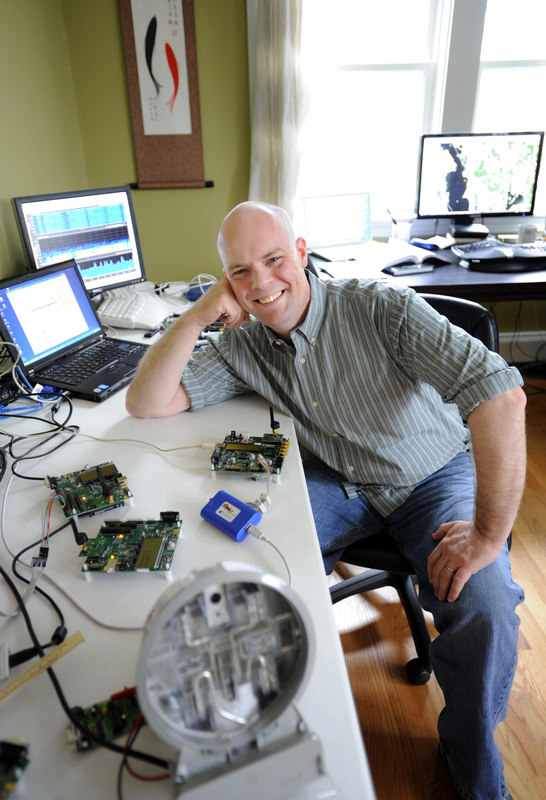SAN FRANCISCO — Computer-security researchers say new “smart” meters that are designed to help deliver electricity more efficiently also have flaws that could let hackers tamper with the power grid in previously impossible ways.
At the very least, the vulnerabilities open the door for attackers to jack up strangers’ power bills. These flaws also could get hackers a key step closer to exploiting one of the most dangerous capabilities of the new technology, which is the ability to remotely turn someone else’s power on and off.
Central Maine Power Co. will start installing the meters next year. CMP will receive a $96 million federal grant to replace old-style meters for its 600,000 customers with smart meters.
Bangor Hydro-Electric Co. also plans to install smart meters for its customers.
The attacks could be pulled off by stealing meters – which can be situated outside of a home – and reprogramming them. Or an attacker could sit near a home or business and wirelessly hack the meter from a laptop, according to Joshua Wright, a senior security analyst with InGuardians Inc. The firm was hired by three utilities to study their smart meters’ resistance to attack.
These utilities, which he would not name, have already done small deployments of smart meters and plan to roll out the technology to hundreds of thousands of power customers, Wright told The Associated Press.
There is no evidence the security flaws have been exploited, although Wright said a utility could have been hacked without knowing it. InGuardians said it is working with the utilities to fix the problems.
Power companies are aggressively rolling out the new meters. In the United States alone, more than 8 million smart meters have been deployed by electric utilities and nearly 60 million should be in place by 2020, according to a list of publicly announced projects kept by The Edison Foundation, an organization focused on the electric industry.
Unlike traditional electric meters that merely record power use – and then must be read in person once a month by a meter reader – smart meters measure consumption in real time. By being networked to computers in electric utilities, the new meters can signal people or their appliances to take certain actions, such as reducing power usage when electricity prices spike.
But the very interactivity that makes smart meters so attractive also makes them vulnerable to hackers, because each meter essentially is a computer connected to a vast network.
There are few public studies on the meters’ resistance to attack, in part because the technology is new. However, last summer Mike Davis, a researcher from IOActive Inc., showed how a computer worm could hop between meters in a power grid with smart meters, giving criminals control over those meters.
Alan Paller, director of research for the SANS Institute, a security research and training organization that was not involved in Wright’s work with InGuardians, said it proved that hacking smart meters is a serious concern.
“We weren’t sure it was possible,” Paller said. “He actually verified it’s possible. . . . If the Department of Energy is going to make sure the meters are safe, then Josh’s work is really important.”
SANS has invited Wright to present his research Tuesday at a conference it is sponsoring on the security of utilities and other “critical infrastructure.”
Industry representatives say utilities are doing rigorous security testing that will make new power grids more secure than the current patchwork system, which is already under hacking attacks from adversaries believed to be working overseas.
But many security researchers say the technology is being deployed without enough security investigation.
Wright said his firm found “egregious” errors, such as flaws in the meters and the technologies that utilities use to manage data from meters.
He said InGuardians found vulnerabilities in products from all five of the meter makers the firm studied. He would not name those manufacturers. One of the most alarming findings involved a weakness in a communications standard used by the new meters to talk to utilities’ computers.
Wright found that hackers could exploit the weakness to break into meters remotely, which would be a key step for shutting down someone’s power. Or hackers could impersonate meters to the power company, to inflate victims’ bills or lower their own. A criminal could even sneak into the utilities’ computer networks to steal data or stage bigger attacks on the grid.
Wright said similar vulnerabilities used to be common in wireless Internet networking equipment, but have vanished with an emphasis on security.
For instance, the meters encrypt their data – scrambling the information to hide it from outsiders. But the digital “keys” needed to unlock the encryption are stored on data-routing equipment known as access points to which many meters relay their data.
Stealing the keys lets an attacker eavesdrop on all communication between meters and that access point, so the keys instead should be kept on computers deep inside the utilities’ networks, where they would be safer.
“That lesson seems to be lost on these meter vendors,” Wright said. That speaks to the “relative immaturity” of the meter technology, he added.
– Press Herald staff contributed to this story
Send questions/comments to the editors.



Success. Please wait for the page to reload. If the page does not reload within 5 seconds, please refresh the page.
Enter your email and password to access comments.
Hi, to comment on stories you must . This profile is in addition to your subscription and website login.
Already have a commenting profile? .
Invalid username/password.
Please check your email to confirm and complete your registration.
Only subscribers are eligible to post comments. Please subscribe or login first for digital access. Here’s why.
Use the form below to reset your password. When you've submitted your account email, we will send an email with a reset code.